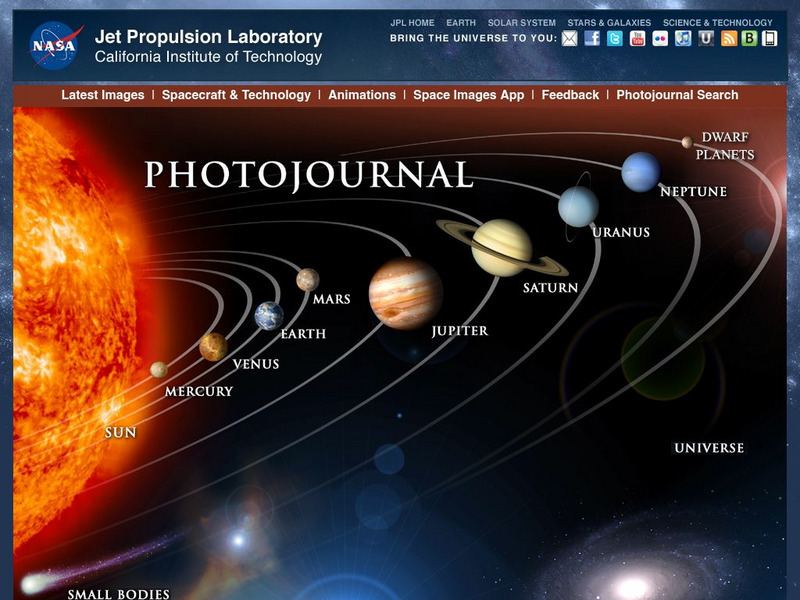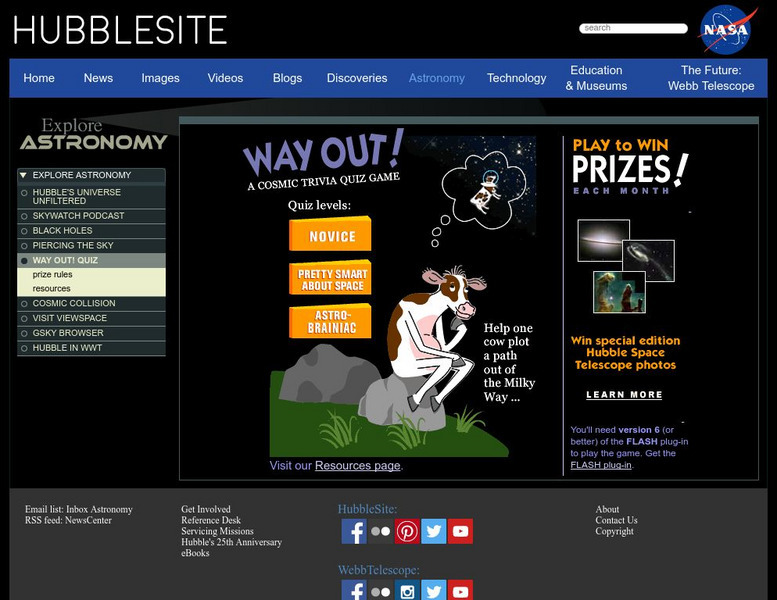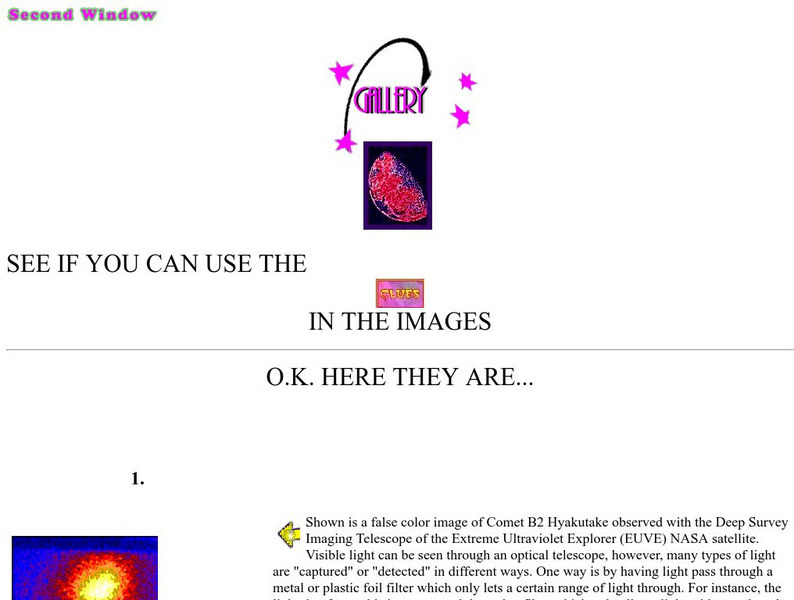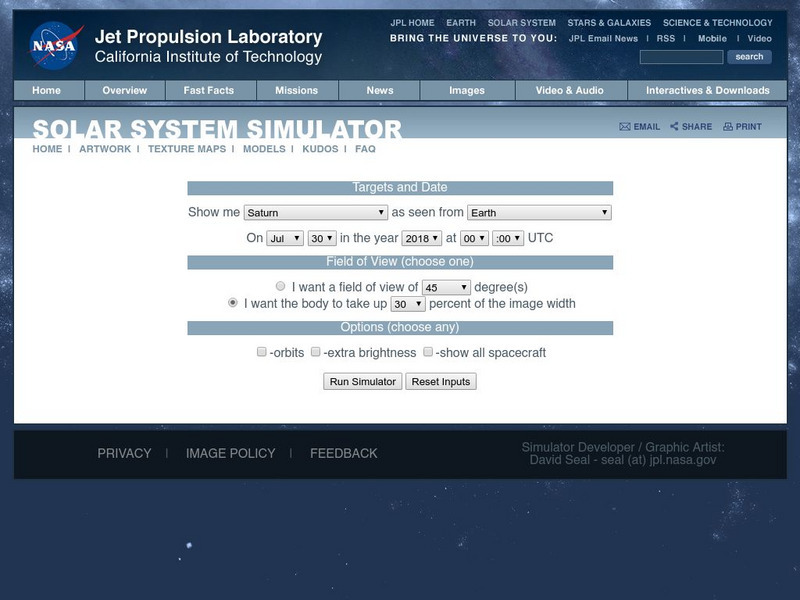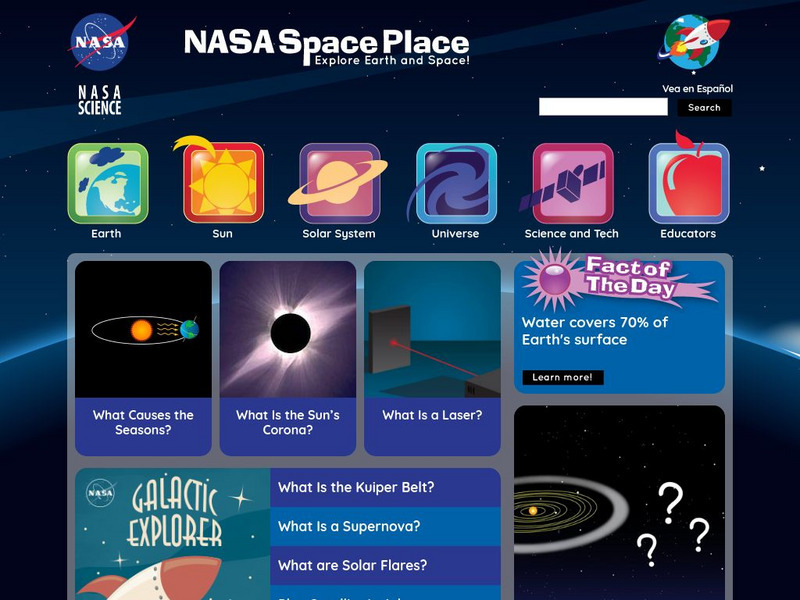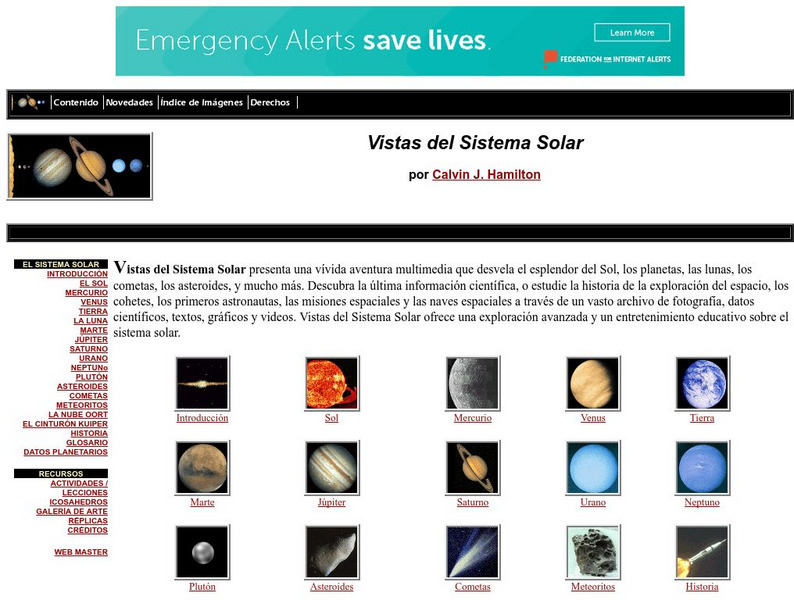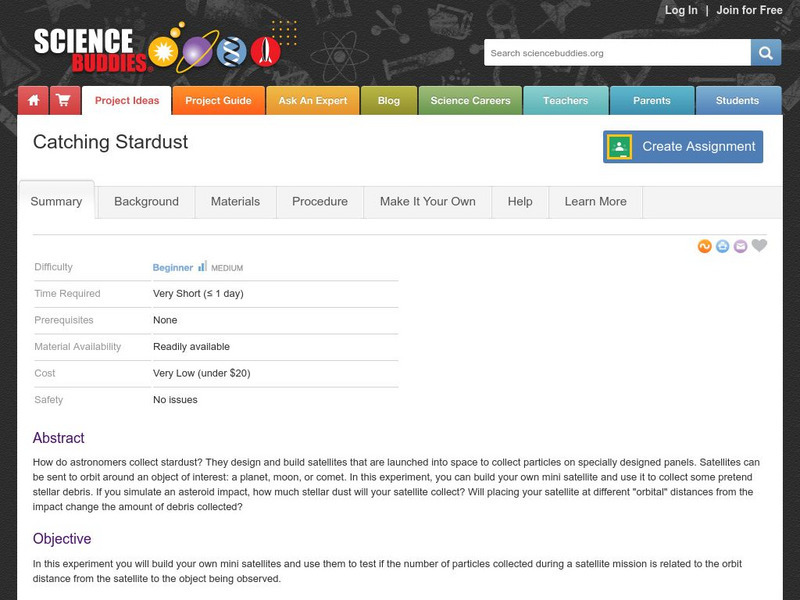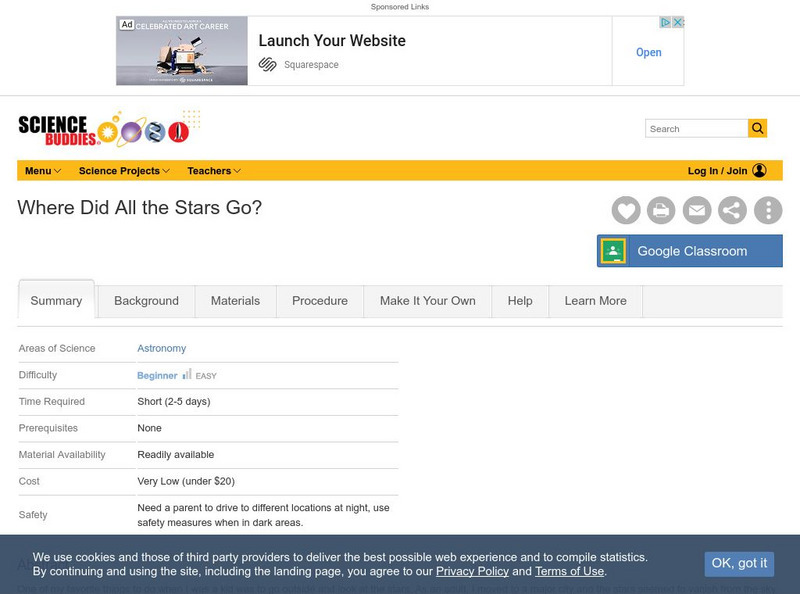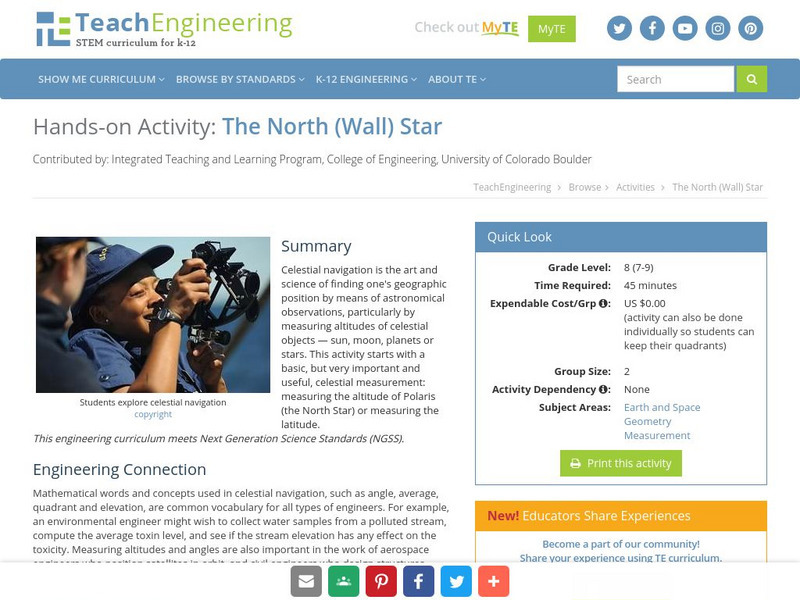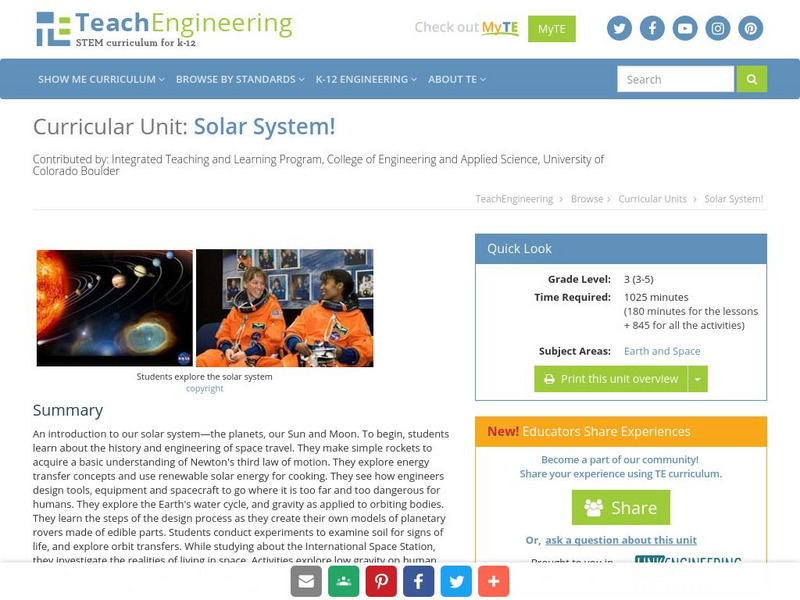NASA
Nasa Star Child: The Solar System
Discover information about parts of the Solar System, along with definitions just by clicking on highlighted vocabulary terms. Be sure to try the "Solar System Activities" to review the material from these pages.
NASA
Nasa: Planetary Photojournal
This NASA site provides access to publicly released images from various Solar System exploration programs.
Space Telescope Science Institute
Hubble Site: Way Out!
Can you help a cow plot a path out of the Milky Way? This hilarious space game is for all ages and is offered by HubbleSite. Users may pick their level of expertise and can choose from novice, pretty smart about space, or an astrobrainiac.
NASA
Nasa: The Space Place: Looking for Water Everywhere!
NASA has discovered water in space. This interactive resource allows you to examine the different planets and moons in our solar system to find out where their water is located.
Quia
Quia: Luna and Beyond (Quiz)
A series of questions about the moons of our Solar System is presented in a millionaire game format.
University of Wisconsin
The Why Files: Cosmic Consummation
After a dramatic introduction to the "Love affair," between Earth and Theia, this site gives support to the claim that the moon was created by a collision between these two planets. Also contains a brief bibliography.
University of California
Center for Science Education: Gallery
A gallery of astronomy images which depict galaxies, comets, the moon, planets, nebulae, supernovae as seen in various regions of the electromagnetic spectrum. Each image in the gallery is described. Fascinating!
NASA
Nasa: Surface Maps of the Solar System
Solar system surface map database. Includes maps of all solid planets and many moons. Maps of gas planets are either based on images taken by Voyager, or are fictitious maps including general storm systems.
ClassFlow
Class Flow: Calendar
[Free Registration/Login Required] The history of our calendar is presented through the passage of time with complete cycles of seasons in ancient history providing a starting place. Complete cycles of seasons are discussed and the...
ClassFlow
Class Flow: Space
[Free Registration/Login Required] This flipchart describes what causes the seasons, explains the moon's phases, and introduces what a constellation is. It utilizes the Activotes to help describe the phenomena.
ClassFlow
Class Flow: Space Math
[Free Registration/Login Required] Take a trip to the moon with your students and use the voting session to review math skills. Page notes are available for every page with the exception of the voting button session. Have a fun trip!
Curated OER
Earth + Moon
This site provides a very interesting overview of our home planet, Earth. Content includes a focus on the atmosphere, the pull of gravity, and the active surface.
Other
Canal Kids: Ciencias (Science for Portuguese Speakers)
Colorful, engagingly written information about astronomy and biology for Portuguese-speaking English language learners. Both subjects are broken down into a broad array of related subtopics. The biology section is particularly helpful...
NASA
Nasa: The Space Place
This site from NASA's Space Place is geared towards early elementary learners. It offers detailed instructions for crafts and activities related to space, games and a teacher resource area. Students can also ask an expert at this site.
Views of the Solar System
Solarviews: Vista Del Sistema Solar
This site offers an exploration and educational entertainment about the solar system. You will be able to study the history of the exploration of space, rockets, the first astronauts, space missions through a large archive of photos,...
TeachEngineering
Teach Engineering: Spectroscopy
Students learn how using a spectrograph helps us understand the composition of light sources. Using simple materials and holographic diffraction gratings (available online at a variety of sites, including Edmund Scientifics and the...
Science Buddies
Science Buddies: Catching Stardust
How do astronomers collect stardust? They design and build satellites that are launched into space to collect particles on specially designed panels. Satellites can be sent to orbit around an object of interest: a planet, moon, or comet....
Science Buddies
Science Buddies: Where Did All the Stars Go?
If you live in a big city or urban area it is hard to see many stars at night. In most urban areas only the most brilliant stars, planets and the moon can be seen. This is because of something called light pollution which is the...
TeachEngineering
Teach Engineering: The North (Wall) Star
Celestial navigation is the art and science of finding one's geographic position by means of astronomical observations, particularly by measuring altitudes of celestial objects - sun, moon, planets or stars. This activity starts with a...
TeachEngineering
Teach Engineering: Solar System!
An introduction to our solar system: the planets, our Sun and our Moon. Students begin by learning the history and engineering of space travel. They make simple rockets to acquire a basic understanding Newton's third law of motion. They...
Curated OER
Nasa: Space Place: Solar System Comparative Sizes
This picture compares the sizes of the moons of the different planets in the solar system.
Curated OER
The Hawai`i Space Grant Consortium: Lunar Images
Part of the Exploring Planets in the Classroom series, this site provides images of the Moon, with Latitude and Longitude reference lines.
Curated OER
The Hawai`i Space Grant Consortium: Lunar Images
Part of the Exploring Planets in the Classroom series, this site provides images of the Moon, with Latitude and Longitude reference lines.
Curated OER
The Hawai`i Space Grant Consortium: Lunar Images
Part of the Exploring Planets in the Classroom series, this site provides images of the Moon, with Latitude and Longitude reference lines.

